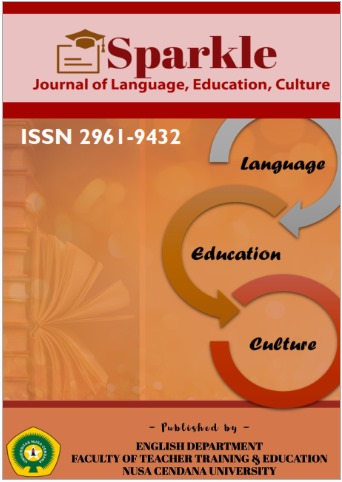THE CULTURAL MEANINGS OF WATER AS THE INDICATOR OF LIFE PROSPERITY FOR MANGGARAI SOCIETY
Abstract
This study aims to describe cultural meanings of water as the indicator of life prosperity for Manggarai society with special reference to the verbal expressions of Manggarai language used in the cultural discourses of agricultural rituals. The study is viewed from cultural linguistics as one of the new theoretical perspectives in cognitive linguistics exploring the relationship of language, culture, and conceptualization. The study is descriptive-qualitative. The result of study shows that conceptualization ascribed in the cognitive map of Manggarai society regarding the cultural meanings of water as the indicator of life prosperity is reflected in verbal expression, Mboas wae woang, kembus wae teku ‘Overflow water bucket, overflow water bucket’. The forms and meanings of linguistic phenomena used in the verbal expression are unique and specific to Manggarai culture as the parent culture in which Manggarai language is embedded. Other than syntactic parallelism, the choice of words and the ways the words are expressed containing beautiful forms that invite sensory pleasures when the verbal expression is spoken and listened to are also characterized by phonological and lexicosemantic parallelism. The meanings stored in the forms of linguistic phenomena used in the verbal expression designate that the indicator of life prosperity for Manggarai society is reflected in the availability of abundant water supply as the source of drinking water that overflows throughout the year. As it is a local wisdom inherited from their ancestors, the verbal expression is beneficial as the frame of reference for Manggarai society in designing natural environment sustainability program portrayed through the lens of Manggarai language as the reflection of Manggarai culture to support the success of green economy.

 Elisna Huan(1*)
Elisna Huan(1*)

